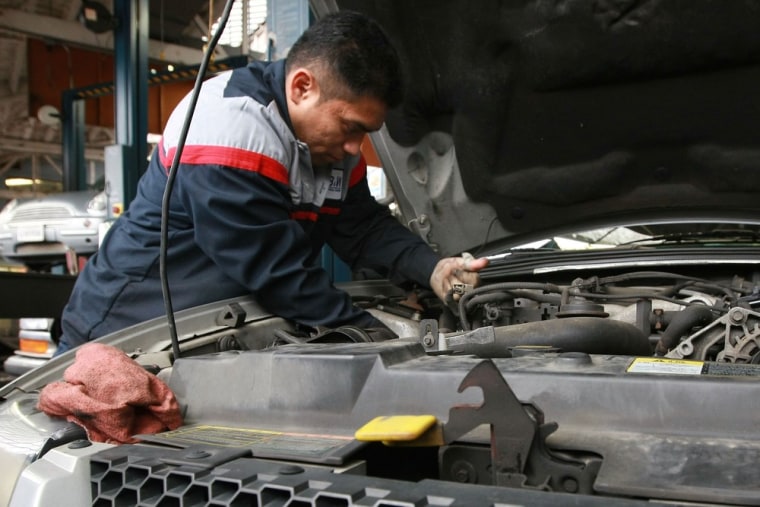Most of us simply take it for granted that when our car needs routine maintenance or repairs, we have the right to choose where to have it serviced.
If a mechanical problem is covered by the warranty, you’d be foolish not to head to the dealer. When you are paying for the work, you might prefer an independent shop.
In a recent survey, Consumer Reports readers gave independent repair shops significantly higher marks than dealers for service, satisfaction and price.
But here’s the rub. Independent repair shops can’t always work on a car because they don’t have access to the same technical information and complex computer diagnostic equipment provided by manufacturers to their dealers.
“Because of this, consumers are often forced to go to a dealership where repair prices can be up to 38 percent higher than at an independent repair shop,” says Sandy Bass-Cors, executive director of the Coalition for Auto Repair Equality, which represents repair shops and auto supply stores.
Jeff McLeod of Marshfield, Mass., experienced that frustration when he took his 2006 Kia Sedona minivan his trusted mechanic. The engine light was on, but the mechanic couldn’t diagnose the problem because he couldn’t read the computer code.
The Kia dealer a few miles away (where McLeod bought his car) had closed, so he had to drive 20 miles to a new dealership.
“The people were total strangers to me,” he says. “It was inconvenient and I was put out by it. I bought the car, and I should have the right to decide where to service it.”
The Motor Vehicle Owners Right to Repair Act of 2011 (HR 1449) would level the playing field between dealers and independent mechanics. The bill, which has bipartisan support, would require the manufacturer of any motor vehicle sold or leased in the U.S. to:
Make all information necessary to diagnose, service, maintain or repair the vehicle available to vehicle owners and service providers. (Automakers could charge a licensing fee for this information.)
Offer to sell the vehicle owner and service providers any related tools or equipment.
Provide aftermarket tool companies with information allowing them to produce diagnostic and repair tools similar to the ones used by dealers.
Automakers oppose the bill, saying it is unnecessary. Daniel Gage, director of communications for the Alliance of Automobile Manufacturers, says all the information independent shops need is already posted online. They simply have to buy a subscription.
Gage says dealers pay “very significant fees to be a dealer and be involved in the manufacturer’s service program.” Manufacturers say independent mechanics should pay, too.
Consumer groups support the concept of a right to repair legislation.
“You pay a lot for the car and the technology that goes into it,” says Chris Plaushin, director of federal relations for AAA. “You should be able to have access to that technology in order to have it repaired at a facility of your choice.”
“There’s the potential for consumers to have more choice, flexibility and possibly save some money” says Ami Gadhia of Consumers Union, the publisher of Consumer Reports.
Rep. Edolphus Towns, D-N.Y., is co-sponsor of HR 1449. In a letter to congressional colleagues, he says a system that forces car owners back to the dealership for repairs is “a hardship for low-and-fixed income motorists, and removes the very basic tenets of ownership choices from those who need it most.
“Basic consumer choice in vehicle repairs means fair-market competition, which keep repairs affordable. Our constituents need help in many areas and this is one that we can easily deliver,” he writes.
Service bulletins: Your right to know
The Right to Repair Act would also require carmakers to make their technical services bulletins available to everyone via the Internet.
“Service bulletins go to both safety and economic issues,” notes Clarence Ditlow, executive director of the Center for Auto Safety. “They give details about problems with a particular model and how to fix them right the first time. This saves the consumer money.”
Dealers automatically get this information. But it doesn’t go to independent shops or even the person who owns the car.
“The person paying an average of $30,000 for a new car today should have the right to have that car serviced properly for its entire life,” Ditlow insists. “That means getting access to this technical information.”
The bill would require the Federal Trade Commission and the Department of Transportation to publish these service bulletins on a government website. This would make it possible for you to see if there’s a problem with your vehicle rather than hope an independent shop catches it when you bring it in.
My two cents
I like my car dealership. It has a great service department. But I also have a trusted repair shop that has taken good care of me. I should be able to choose where to go for service.
What if I have a breakdown or my “check engine light” comes on when I’m away from home and there’s no dealership around? Should I be forced to drive my car or have it towed to a dealer? I don’t think so.
And consider this: If service bulletins were publicly available, it would prevent so-called “secret warranty” repair programs. This is when a manufacturer knows it has a problem with a vehicle, tells its dealers about it and they will fix the problem if a consumer makes a big enough fuss. That’s just not fair. If there’s something wrong with your car, you have the right to know about it.
Competition is good for the marketplace. As long as manufacturers are not required to give away any trade secrets – and this bill specifically protects against that – then I believe Congress should move forward on the Motor Vehicle Owners Right to Repair Act.
